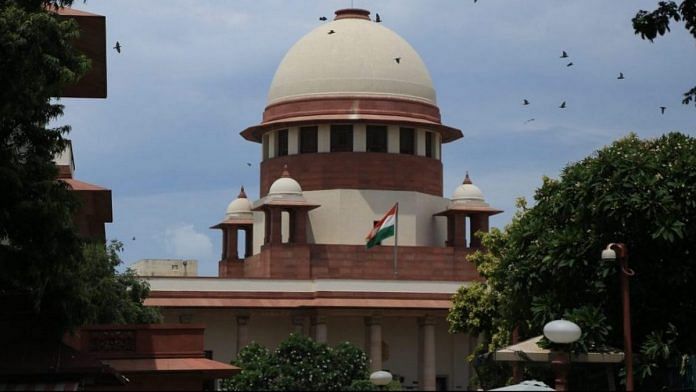New Delhi: The Supreme Court Tuesday issued a pre-admission notice to the Narendra Modi government on a set of petitions seeking a court-monitored enquiry into the Pegasus spyware snooping row.
A three-judge bench led by Chief Justice of India (CJI) N.V. Ramana issued a formal notice after Solicitor General Tushar Mehta expressed his inability to file a detailed affidavit revealing whether the government used the military-grade spyware — made by an Israel-based firm called NSO.
So far, the bench had been hearing the matter without issuing any notice.
The court had also asked the government to respond to the petitions, which was done Monday by way of a six-page affidavit.
But the bench had then advised Mehta to file a detailed affidavit after the petitioners pointed out that the reply was not a definite stand on whether the government had used Pegasus or not.
The bench had remarked Mehta was being “reluctant” to furnish the information, a charge that was denied by the solicitor general.
What the SG said during hearing
During the hearing Tuesday, Mehta argued against making this information public, saying it was not in public interest, as national security aspects are involved.
The government, he assured, was ready to make a disclosure before a committee of technical experts, which it proposes to set up, which will in turn submit its report to the court.
The solicitor general said that in view of his submissions, the six-page affidavit placed before the bench a day earlier would suffice and there was no need to file an additional affidavit.
Also read: Pegasus snooping a form of cyber-terrorism, says ex-RSS ideologue Govindacharya, moves SC
We will set up panel, says court
After this, the bench issued notice before admission and listed the matter for further hearing after 10 days.
The CJI said the judges will deliberate on how to proceed with the matter.
“We thought a comprehensive reply would come but it was a limited reply. We will see, we will also think and consider what can be done. If a committee of experts needs to be made, or some other committee, we will do so,” the court told Mehta, who requested the bench to let the government form the panel.
“This would not be a committee with government officers. It will have neutral experts,” he reiterated.
‘Want competent authority to file affidavit’
The judges told Mehta that even they do not want to compel him from divulging any information that could potentially harm the country’s national security.
“We would never ask you to make any such disclosure, irrespective of whether such a prayer is made or not. The question here is that there are individuals, civilians, person of eminence who suspect and allege snooping or hacking. In case of civilians also, rules permit (interception), but only subject to the permission of the competent authority,” said Justice Surya Kant, who is also a member of the bench.
All that the court wanted was that competent authority to file an affidavit before it, he added.
“We don’t want you to say anything related to national security. What can be done is, we will issue a simple notice and let the competent authority under rules take decision to what extent information is to be disclosed and we will see what is to be done,” the judge said.
Just want to know if Pegasus was used, say petitioners
From the outset, Mehta contended that the government affidavit was sufficient and a second affidavit was uncalled for.
According to him, terrorist organisations will take advantage of a public disclosure on which software is used for interceptions or surveillance to change their communication settings.
He said as Sibal had pointed out Monday, there were rules allowing interceptions.
“These are all necessary to address national security, combat terrorism. The petitioners want the government to divulge which software was not used. If that happens, those who are likely to be intercepted for terrorist activities, they may take preemptive or corrective steps. We do not have anything to hide, but this (information) cannot be given in an affidavit or become a matter of public debate,” he contended.
Senior advocate Kapil Sibal, appearing for some petitioners, contested this claim, saying that even his clients were not seeking any national security-related information. “We just want to know whether Pegasus was used or not,” he said.
Also read: Hopeful IT panel will take up Pegasus issue going forward, says Shashi Tharoor



